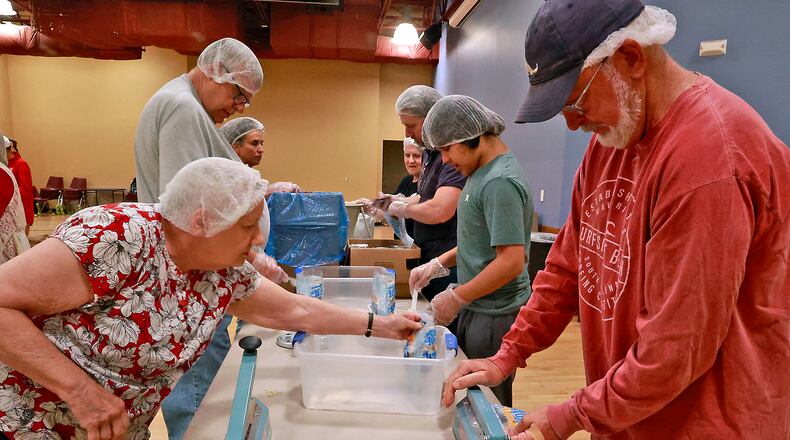The Mental Health and Recovery Board of Clark, Greene and Madison Counties placed a 1.65-mill, 10-year levy on the ballot for services in the three counties. Greta Mayer, chief executive officer, said it funds counseling, medication, the 988 Suicide and Crisis Lifeline with a center in Greene County and addiction services.
While the two organizations and issues are separate, Fagans said: “I think our missions are very complementary.”
Mayer agreed, noting USS and MHRB work together on some programs and share common goals for a healthier community.
“When we can all have a piece of that healthful life, it’s a win for everyone,” Mayer said.
Early voting has started and will continue through Nov. 5.
At look at each issue:
United Senior Services levy
Clark County homeowners would continue to pay the same they pay now, if the USS renewal is approved. That means for the owner of a $100,000 home, it would remain $49 a year.
Fagans noted the value is based on the auditor’s appraisal, not the market value of a house.
Voters first approved the issue in 1989, Fagans said, and it has been renewed in five-year increments ever since, including the last time in 2018. Ohio law necessitates the five-year lengths.
“That helps us stay top of mind with voters,” she said, meaning they know how the money is being spent. “It stays right here locally, helping their friends and neighbors.”
And more of those friends and neighbors are older people, Fagans said. About a third of Clark County is 55 or older, she said. Census figures say the percentage is expected to continue to grow until 2040 before any plateaus.
“And we are responding to that,” she said.
The big three USS programs the levy funds provide meals, medical transportation and in-home care assistance.
“Well over 80 percent of the levy money is spent on those big three service categories,” she said.
It also helps fund “a whole host” of smaller programs, Fagans said, including ones that assist with case management, mental health and helping people stay in their homes.
A 2022 USS community survey of 25,000 households that targeted those 55 and older offered priorities to the group, including: maintaining homes to live there safely; serving as a trusted resource for programs and assistance; helping with interior maintenance, such as housework and personal care; offering transportation aid; helping with caregiving.
Fagans said remaining in their own houses is a priority for older residents.
“I have never had an older person tell me, ‘I can’t wait ‘til I move into the nursing home,’” Fagans told the Clark County Commission in April.
The levy generates about $1.4 million annually, just a little less than 60% of the budget for USS, formerly known as Elderly United.
The group offers recreational activities at some of its locations, like pickleball, and coordinates trips and other events. The centers are in downtown Springfield, Tubman Towers in Springfield, plus New Carlisle and Enon.
Fagans noted that very little levy money is used for the recreation centers and it does not help people who take the senior trips and tours, which the participants pay to take.
Levy supporters are campaigning much as they have in the past, communicating with their members and the larger community via talks at clubs and civic groups.
“So far I have not heard any negativity,” Fagans said.
Mental health levy
Despite its name, Mental Health and Recovery Board of Clark, Greene and Madison Counties funding follows the residents, Mayer said. That means Clark County levy dollars are spent on Clark County residents.
The majority of renewal funds would go mental health services and to addiction treatment, Mayer said.
Taxpayers would continue to pay what they do currently, if approved. That is less than $5 monthly, or $58 per year, for the owner of a home valued at $100,000.
The last levy for the same amount passed in 2013. It generates $4 million annually.
Demand for services has never been higher, Mayer said, and passage ensures the safety net will remain in place.
She said the campaign has involved talking with friends and family of the people affected most directly by the funding.
“Helping get the word out has been easier going through those networks,” she said.
Every speaking engagement and event has offered them positive feedback, Mayer said.
“People want to know more about mental health and substance abuse prevention efforts,” she said. “They want to be more involved.”
One recent talk was to Springfield Rotarians, where her program was more broadly focused on mental health and its place on what is described as the wellness wheel. The wheel includes physical and emotional components, plus environmental and occupational pieces
“There are things we can all do ... to help our whole health,” Mayer said.
She also said people are talking more openly about mental health and removing stigmas attached to it.
“We’ve definitely seen an improvement there, and I think it is going to continue,” she said. “I really give credit to the young people.”
She said youth-led prevention efforts and discussion has helped older generations develop awareness of mental health.
The levy supports the 988 Suicide and Crisis Lifeline, allowing people facing mental health emergencies to dial 988 instead of 911. The Greene County call center operators know the resources and can direct people in Clark County accordingly, Mayer said.
“If we have a (Clark County) resident that’s calling and they’re answering the calls, they’re very familiar with our care network and how to make referrals to get that person the follow up here that they need,” Mayer said when she spoke to the Clark County Commission in June.
She said more residents have used the 988 line, but for those who are facing crisis and hesitating, Mayer said: “Go ahead and make the call.”
About the Author

